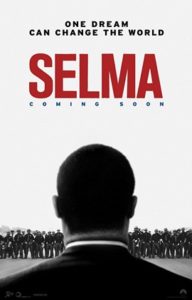This post was written by Hatchet staff writer Eric Robinson.
★★★★✰
From the simplicity of “The Theory of Everything” to the jingoistic hagiography of “American Sniper,” 2014 was a year that exposed the flaws and limitations of the biopic genre.
Filmmakers revealed a pervasive unwillingness to explore the human complexity of their subjects in favor of stereotyping and even misrepresenting them for the purposes of creating easily digestible Oscar bait.

So it was a shock to see a film as high profile as “Selma” depict one of the most revered figures in American history, Martin Luther King Jr., as he truly was: a flawed and complicated human being.
“Selma” follows King (David Oyelowo) and his followers as they attempt to stage political marches in Selma and convince President Lyndon B. Johnson (Tom Wilkinson) to support legislation that guarantees black Americans the vote.
The absolute genius of “Selma” is the decision to make King a supporting character in his own film. Whereas a lesser film would narrowly focus on King’s experience, “Selma” instead focuses on the Civil Rights Movement’s political efforts as a whole, functioning like Steven Spielberg’s “Lincoln.”
By casting a slight shadow on King, “Selma” avoids idolizing him and instead allows the decisions King makes as a leader and the small intimate moments with his wife speak for themselves. Keeping with this very human approach, “Selma” smartly integrates King’s infidelities and personal doubts into the narrative, creating a portrayal that is both rich and honest.
Director Ava DuVernay presents a film with a power that is effective despite the measured approach she takes to the subject matter. The scenes in which peaceful protesters are being brutalized feel terrifyingly real and violent without being excessive. DuVernay is fearless in her effort to link the seemingly distant past to our present, and the result is downright uncomfortable and moving.
In one scene, King confronts the grandfather of a murdered protester. Whereas most filmmakers would attempt to wring emotion from the moment by having King make an inspirational speech, Oyelowo’s King struggles to say much of anything, eventually settling on, “There are no words.”
“Selma” is the greatest biopic of 2014. It’s a film that understands that sometimes, honesty is the best way to honor an icon.




